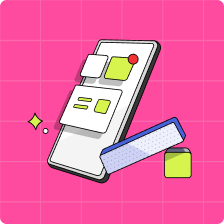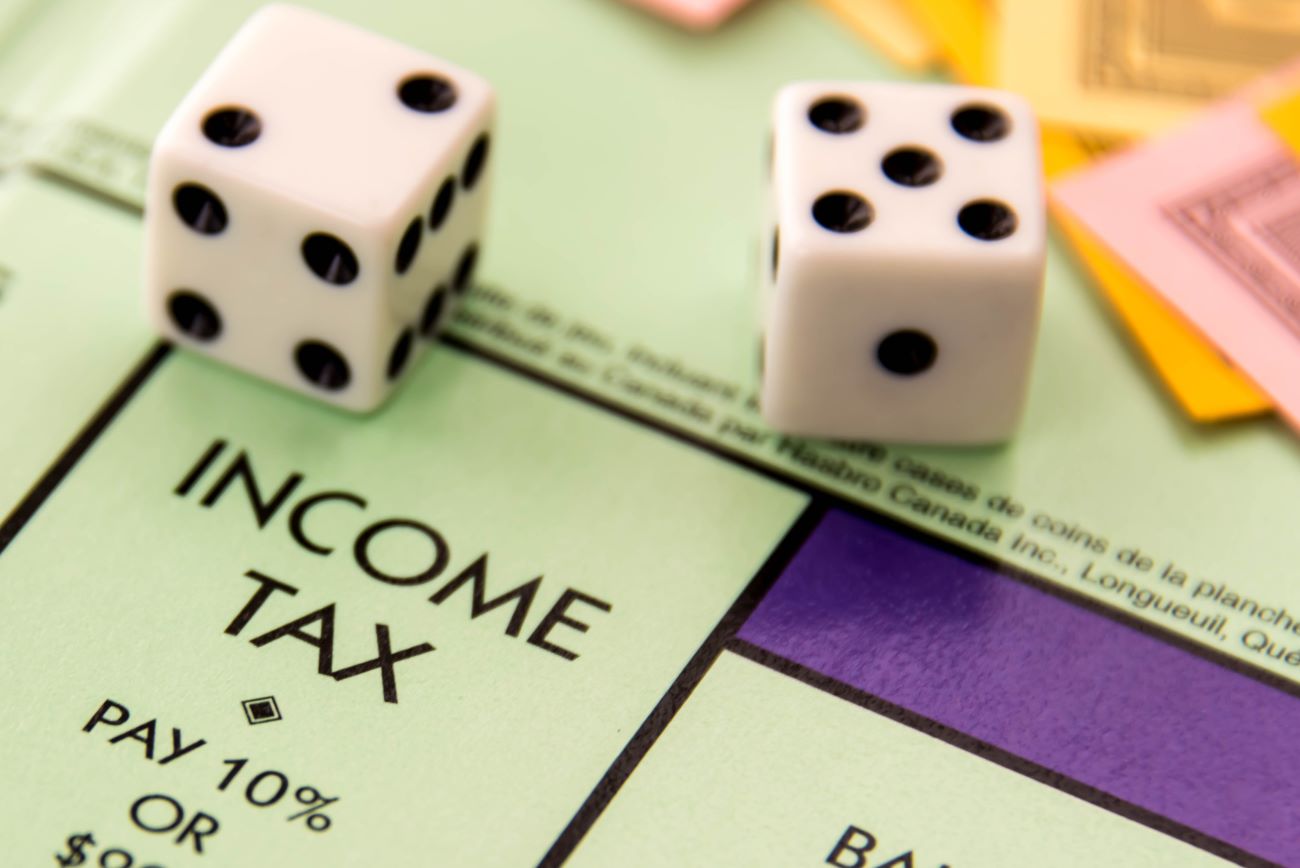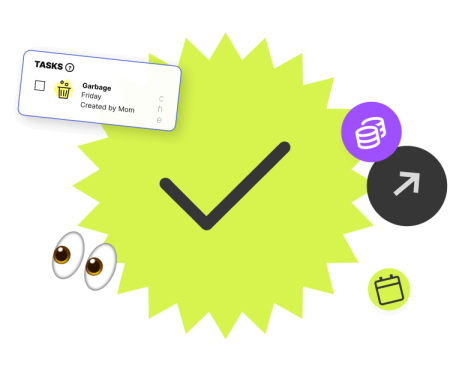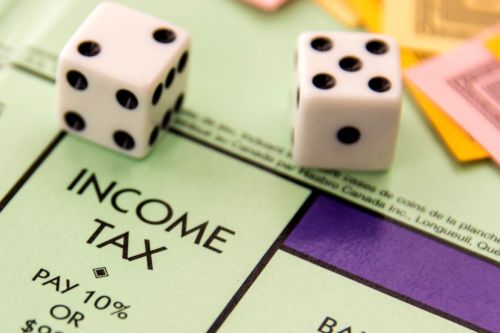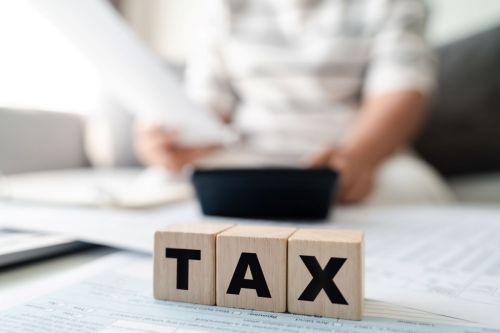Benjamin Franklin, an 18th-century American scientist and inventor, famously said, “In this world, nothing is certain except death and taxes.” Ask anyone of a certain age, and they’re likely to agree with Ben. While teens might feel invincible to that first eventuality, once they begin their career and receive their first pay stub, they’ll understand that paying income tax is a part of life.
Because filing income taxes is something that most working Canadians have to deal with on a yearly basis, it’s important that tweens and teens are familiar with the concept before they enter adulthood. After all, it’s better to prepare them now: Remember what it felt like when you realized how much of your income goes to taxes?
In fact, teens can start filing their own income tax return as soon as they have a part-time job or any kind of side hustle. In this income tax guide, parents and their tweens and teens will learn how to get that conversation going. We’ll go over easy ways to explain how income tax works, why we have to pay it, what we can do to pay less, and how to check if you’re eligible for a refund. (It’s not all bad, right?)
Key takeaways
- For almost every dollar you earn, you will have to pay some of it back to the government in the form of tax.
- Paying the required income tax is required by law. If you owe tax and don’t pay, you can face penalties, such as fines or even prison time.
- The Canadian government relies on taxpayers to report their income honestly and accurately.
- The amount of money or percentage of income you pay to the government is determined by the “tax bracket” you’re in.
- Generally, the more money you make, the more income tax you pay.
- Not all income is taxable. Things like gifts, inheritances, and school scholarships are tax-free.
- You can reduce your income taxes by putting aside money in certain investments, deducting business expenses, and applying tax credits.
What is income tax?
Income tax is money paid to the government, based on a person’s or business’s income. For almost every dollar you earn, the government takes a small percentage. That income can be earned or unearned, from wages and tips from a job (earned) to unemployment benefits and financial prizes (unearned).
As a Canadian resident, you’ll pay income tax to both the federal government and the provincial or territorial government where you live. Both of these are collected by the Canada Revenue Agency (CRA).
This wasn’t always the case in Canada. Income tax was introduced in 1917 to help finance the First World War—everything from keeping wheat production going in the Prairies to making airplanes and artillery shells. Before that, Canada was a tax-free haven, and the government used that status to attract skilled immigrants and investors to the country.
While England and the United States had already introduced income tax, Canada relied on charging high customs duties on imported goods. Once income tax was introduced, it provided a steady stream of funding for the country, and there was no going back.
Why do we have to pay income tax?
Paying income tax may be considered a civic duty, but it’s also required by law. If you don’t pay income tax owed, you could face penalties, such as fines or prison time. The CRA collects income tax to pay for the government’s many different expenses.
You can give your teen specific examples of what income tax pays for: government workers, health care, schools, roads, provincial and national parks, and a number of social benefits. Income tax is also used to pay for government programs that help families pay for basic needs, such as food and shelter.
In even simpler terms, think about income tax like a slice of the money you earn. We share a portion of our money with the government and we keep the rest for ourselves—one piece of apple pie for the good of the public, and the rest of the pie for us to enjoy. Win-win!
How does income tax work in Canada?
Forget whatever you learned about income tax from playing Monopoly—there’s a lot more to it than doling out $200 if you land on the unpopular square. In real life, the amount of money or percentage of income you pay to the government is determined by the tax bracket you’re in—in other words, the range your income falls under. Generally, the more money you make, the more income tax you pay. Put another way, if you pay a lot in income tax, you’re a very successful person!
2024 tax brackets and rates for federal income tax
| 2024 income tax brackets | 2024 income tax rates |
| $53,359 or less | 15% |
| $53,359.01 to $106,717 | 20.5% |
| $106,717.01 to $165,430 | 26% |
| $165,430.01 to $235,675 | 29% |
| More than $235,675.01 | 33% |
Income tax in Canada is reported by filing paperwork (or increasingly, an electronic document) called a tax return. In it, you must list all your sources of income and the amounts. You should also list anything that offsets that amount, such as tax deductions (things that reduce your taxable income, like an RRSP contribution) or tax credits (things that reduce the amount of tax you owe, like tuition or other education costs) for which you’re eligible.
Canada’s complex tax system is largely based on trust. The government mostly relies on taxpayers to report their income honestly and accurately. But you could still be audited (when the CRA opts to take a deep dive into your tax info, to make sure what you’ve calculated is accurate), so keep your tax records on-hand and safely stored for at least six years (the length of time the CRA recommends), just in case.
What is the CRA?
The Canada Revenue Agency (CRA) is the federal government department whose job is to manage taxes that are paid by or owed to you (depending on what benefits you are eligible for), and to make sure you’re following all the rules. All in all, the CRA collects taxes, enforces tax laws, and delivers credits and other social benefit programs.
When you file your income tax return, you (or your tax professional) are sending it directly to the CRA, along with any money you owe. Any money owed to you will also come directly from the CRA.
Read more about tax definitions for kids.
Income tax rates and tax brackets
Every year, the CRA establishes tax rates, also known as tax brackets, to determine how much each money-earner has to pay. It establishes a base rate for the lowest income bracket, and rates go up from there in what’s called a “graduated” tax system.
For example, in the 2024 tax year, CRA set a base income tax rate of 15 per cent for anyone making up to $53,359 in taxable income. Then, on the next $52,812 in income, they charged 20.5 per cent. On the next $58,713 in income, they charged 26 per cent. And so on.
Your teen might be wondering if there is a minimum taxable income you can earn before paying taxes in Canada, and, yes, there is. In 2024, it is set to $15,705. When you’re in the lowest tax bracket, you won’t pay tax on the first $15,705 you earn, which helps low-income earners. It also helps young people who may only have a part-time job, so your teen may not have to pay any income tax at all.
Is all income taxable?
The good news is, not all income is taxable. Here are a few examples of income that is taxed and tax-free in Canada:
Taxable income includes:
- Employment income
- Dividends or earnings paid out by a company you invest in
- Rental income
- Interest (on an investment or bank account savings)
- Pension income
- Withdrawals from RRSPs
Tax-free income includes:
- Most lottery winnings
- Most gifts and inheritances
- Withdrawals from TFSAs
- Canada child benefit payments
- School scholarships
- Strike pay from a union

What are income tax refunds, and how do they work?
Say you bought some new clothes at a store only to look over the receipt at home and find out the cashier mistakenly overcharged you. You realize the price tag doesn’t match up with what you were charged and you bring the items back to the store for a partial refund or credit. That’s sort of how tax refunds work. They’re a result of overpaying the government, but they’re quickly resolved once the CRA does its own calculations based on your income tax return. Then the money is returned to you.
Your tax refund may also depend on if you’re an employee or self-employed.
If you’re an employee
Your employer will deduct taxes on behalf of the government from each paycheque you get, so you never even see that extra money to begin with. When it’s time to file an income tax return listing your income, tax deductions, and tax credits, you will be able to see if you actually paid the government more than you owed. Then the government refunds the money. The CRA’s goal is to send the refund within two weeks if you file your tax return online, and within eight weeks if you file a paper return. If you find out that you actually underpaid the government, then you must pay the difference by April 30, or you will be charged interest. For example, if you file your 2021 taxes and owe money to the CRA, it must be paid by April 30, or you will be charged compound daily interest starting on May 3, 2022.
If you’re self-employed
You’re responsible for managing your own cash flow from any income earned and setting aside enough money to pay your income tax each year. One way to do this is by calculating your average tax rate at the beginning of the year. Then transfer that percentage of your income from every paid invoice or job to a separate savings account. At the end of the calendar year, you add up all your income, then subtract expenses, deductions, and tax credits you can claim (anything from car and gas payments to RRSP contributions to charitable donations). Once you’ve calculated the amount you owe, you must send the full amount to the CRA by the tax-filing deadline. If you’re self-employed, you have until June 15.
How can you reduce income taxes?
No one likes paying taxes, even if they appreciate the benefits that come with living in a society with health care, schools, and community centres. That’s why there are plenty of clever (and legal) strategies to pay less in income tax. Some of the most common ways to reduce income taxes in Canada include:
1. Put money in a TFSA
A tax-ree savings account (TFSA) is a way to make money on your savings without losing part of that growth to taxes. Unlike other types of investment accounts, you don’t have to pay taxes on money you make through a TFSA and you don’t have to pay tax on withdrawals.
2. Max out RRSP contributions
A registered retirement savings plan (RRSP) is one of the most popular ways for Canadians to save money, while reducing the income tax they would otherwise owe. Each year, you’re allowed to set aside up to 18 per cent of your income or a specific amount set by the CRA, whichever is smallest, to put into an RRSP. Then you can deduct that amount from your overall income. For example, if you earn $50,000 and you put $9,000 into an RRSP account, you will only have to pay income tax on $41,000. All the while that $9,000 is growing and earning interest for your retirement. It’s a pretty sweet deal, right? You still have to pay tax on this money when you withdraw it around age 65, but, by then, you’re likely in a lower tax bracket.
3. Deduct eligible expenses
It pays to get to know which deductions you can claim in your tax return. For example, if you’re self-employed, employed part time, or have a side hustle, like doing your neighbours’ yardwork or selling crafts on Etsy, you can deduct allowable work expenses that you need to do your job. Think materials and supplies, marketing costs, like flyers, and maybe even a portion of your phone and internet bill. When you’re older and you’re working at home (and paying rent or a mortgage), you might also be able to claim certain home office expenses to reduce your taxable income. You may even be able to claim medical expenses, such as dental work, and tuition for post-secondary education, depending on whether you go to a trade school, college, or university.
4. Hire a professional
One of the best ways to save money on income tax is to hire an accountant or tax expert who knows the ins and outs of tax deductions, expenses, and tax credits you can claim in any given year. But for most teenagers without a lot of income sources, simple and free tax software should get the job done.
Who should file an income tax return?
If you’re just starting to make your own money, you might be wondering when it’s time to start filing taxes. Whether you’re 13 or 31, age is not a factor in filing your income tax return. Say you’re a student who made more than $2,500 (after expenses) running a small business last summer, you still need to file a tax return. In fact, all working children and teens should consider filing an income tax return as soon as they start earning income. Even if you won’t owe taxes, or get a refund, there are benefits to filing early in life, such as growing your RRSP contribution room.
Officially, you are required to file an income tax return if you have to pay tax for the year, you want to claim a refund, or you want to claim certain tax credits, such as the Canada workers benefit. This benefit helps individuals and families who are working and earning a low income.
How to file taxes
Now that we’ve covered all the bases, do you think you’re ready to file your own taxes? Before getting started, find out what’s new for the current tax year. In 2021, for example, your taxes may be affected by COVID-19 benefits, or other changes to benefits and credits. Be aware of key dates, too. When are taxes due in Canada? They’re usually due on April 30. Since that date falls on a Saturday in 2022, the deadline for filing 2021 taxes has been changed to May 2.
You can file your taxes online or by paper. Or have someone else, such a tax professional, file them for you.
Some of your tax-filing options are:
- A NETFILE- or EFILE-certified tax software. There are plenty of free or pay-what-you-can models.
- A community volunteer tax clinic
- Tax-filing assistance from a CRA agent
- A professional tax and accounting service
When you’re done preparing it, send the CRA your completed income tax return, electronically or by mail. Then make the payment or wait for your refund—whichever you’ve calculated. The last step in the process before you can officially close the books on the last year is waiting for your “Notice of Assessment (NOA),” which is simply a document from the CRA that will confirm the status of your payment or refund, or indicate a change to your tax return.
Activities to teach kids about taxes
Teaching kids about taxes might seem a bit dry (who are we kidding; it can be a bore for most adults!), but the sooner you get them interested, the more knowledge and confidence they’ll have on the topic over the long term. Taxes might feel complex, but once you’ve covered the basics described in this article, you can start playfully putting some of these rules into practice:
- Charge kids income tax on allowance. This may sound like a cruel joke, but it helps tweens and teens learn about paying tax. You get to play the role of the CRA by taking a cut of their regular allowance, say 10 per cent, off every payment (which is actually a rock-bottom rate).
- Try making a game out of taxing members of the family. Each person can contribute a set amount to a jar each week. At the end of the week or month, you all decide on a collective thing to do with the money.
- Make a list of the cool things that taxes pay for. Your kids may get a kick out of hearing that their favourite provincial park—and the salaries of those park rangers—are paid for by taxes.
- Review your teen’s pay stub or show them your own. Together you can look at how taxes impact the final take-home pay. It will illustrate that they’ll be taking home much less pay than they think and help them understand how important it is to save and budget.
- Get your teen involved with tax filing. If your teen has started to file their own taxes, hurray for them! But if not, they can still roll up their sleeves and help you with everything from organizing receipts to researching expenses, tax deductions, and tax credits you’re eligible to claim. If you’re meeting with a professional to do your taxes, bring your kid along.
Read more about the best money games for kids
Why your kids should understand how income tax works
Explaining the ins and outs of the adult concept of income tax will help your tween and teen launch their financial independence. Prepping them in advance means they don’t have to learn it the hard way once the time comes for them to file an income tax return. They’ll be ready to handle their own cash flow one day and not feel overwhelmed by the number of surprises coming their way—including the shock of getting that first paycheque and noticing it doesn’t add up to what they were expecting. Putting value on where all that money goes might even make it a little easier to part with.
Mydoh can also help your tween or teen build the foundation of financial literacy. With the app, they can earn money through tasks and allowances, and spend it wisely with their Smart Cash Card. Best of all, Mydoh gives parents oversight, so they can keep track of their kids’ progress and spending habits.
Download Mydoh and help build the foundation of financial literacy for your kids and teenagers.
This article offers general information only and is not intended as legal, financial or other professional advice. A professional advisor should be consulted regarding your specific situation. While the information presented is believed to be factual and current, its accuracy is not guaranteed and it should not be regarded as a complete analysis of the subjects discussed. All expressions of opinion reflect the judgment of the author(s) as of the date of publication and are subject to change. No endorsement of any third parties or their advice, opinions, information, products or services is expressly given or implied by Royal Bank of Canada or its affiliates.
